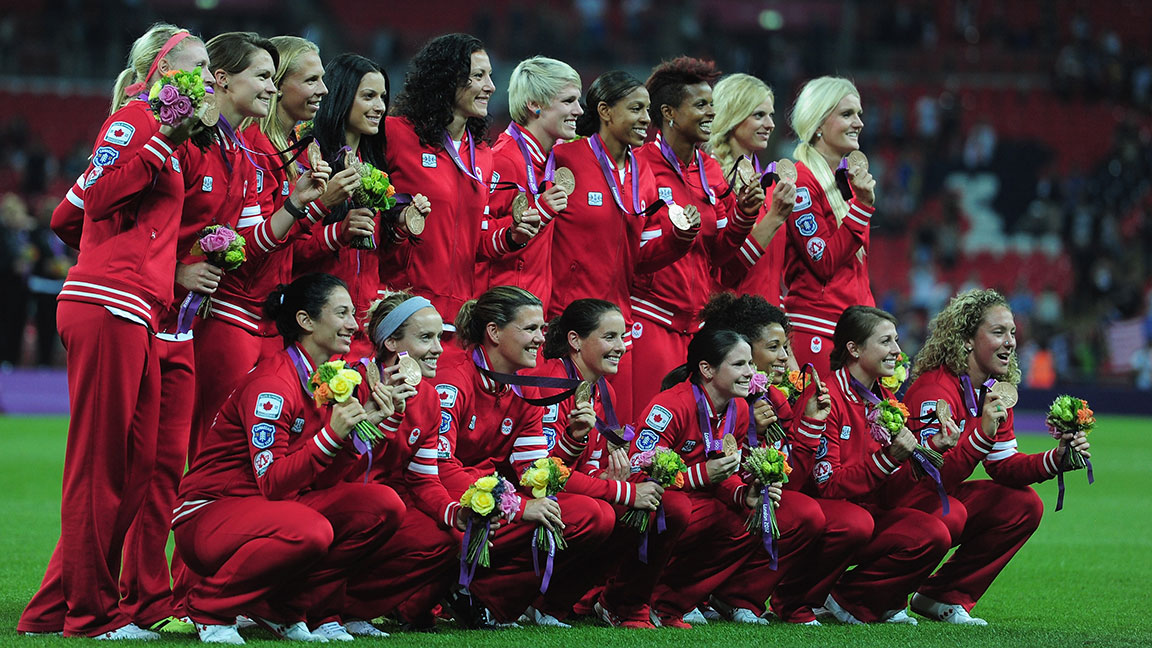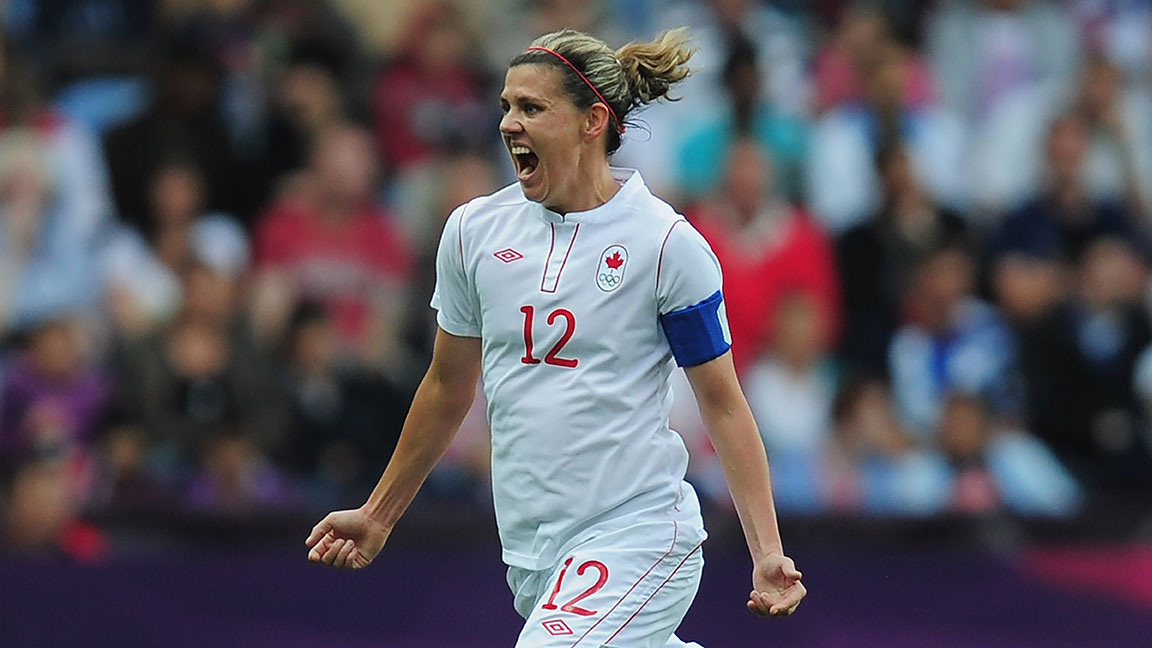
#ThankYouSinc
Story by Richard Scott. Photos by FIFA Getty Images.
This is crazy.
Canada had just eliminated the hosts Great Britain in the London 2012 Olympic Quarterfinals and Christine Sinclair was reflecting on the last 90 minutes, or maybe it was the last two weeks or maybe even her last 13 years as an international footballer.
For the first time ever, she was just one win away from winning an Olympic Medal.
Four years earlier, Canada had lost their 2008 Olympic Quarterfinals to the Americans in Shanghai, China. That was a crazy match, you know, the kind of crazy match in which your opponents take a 1-0 lead in the 13th minute, your goalkeeper gets hurt and replaced in the rain, but then after an hour delay from lightning you drive home the 1-1 equaliser from 25 yards out just as the match gets going again.
“She shoots, she scores – Christine Sinclair makes no mistake with a crucial equaliser,” roared Nigel Reed, Canada’s play-by-play voice on CBC Sports. “What a strike,” echoed Jason deVos, his colour commentator for the Beijing 2008 Olympic Games.
“That’s the type of player she is,” said Brandi Chastain, Sinclair’s future teammate who in 2008 was on NBC’s American broadcast for the Quarterfinals classic. Sinclair “is very dangerous and she can be hot in an instant.”
Sinclair was already one of the best strikers in the world in 2008, but it was team success for which she truly longed. Her 2008 goal was the last for Canada that day as the Americans won the Quarterfinals in extra time on a Natasha Kai header in the 101st minute. Now four years later, Sinclair again scored the last goal of the day for Canada, but this time it was the 2-0 goal on a free kick that broke the British six-player wall and smashed the hearts of the Olympic host nation.
Yeah, this was crazy, but then again… she really had no idea what crazy was about to become.
In the four years in between Olympic Quarterfinals, Sinclair had captained Canada to the 2010 Concacaf Championship in Mexico, broken her nose and crashed out at the 2011 FIFA World Cup in Germany, won back-to-back WPS championships with two different clubs in the United States, and won a Pan American Games Gold Medal in Mexico in Canada’s first major tournament under Head Coach John Herdman.
At the London 2012 Olympic Games, Canada finished third in their group, but qualified for the knockout phase thanks to their record with four points from three matches: a 1:2 loss to the FIFA World Cup champions Japan, a steady 3:0 win over South Africa, and an inspiring come-from-behind 2:2 draw with Sweden. Sinclair scored two goals in the win over South Africa and was part of the build up on both Melissa Tancredi goals against Sweden.
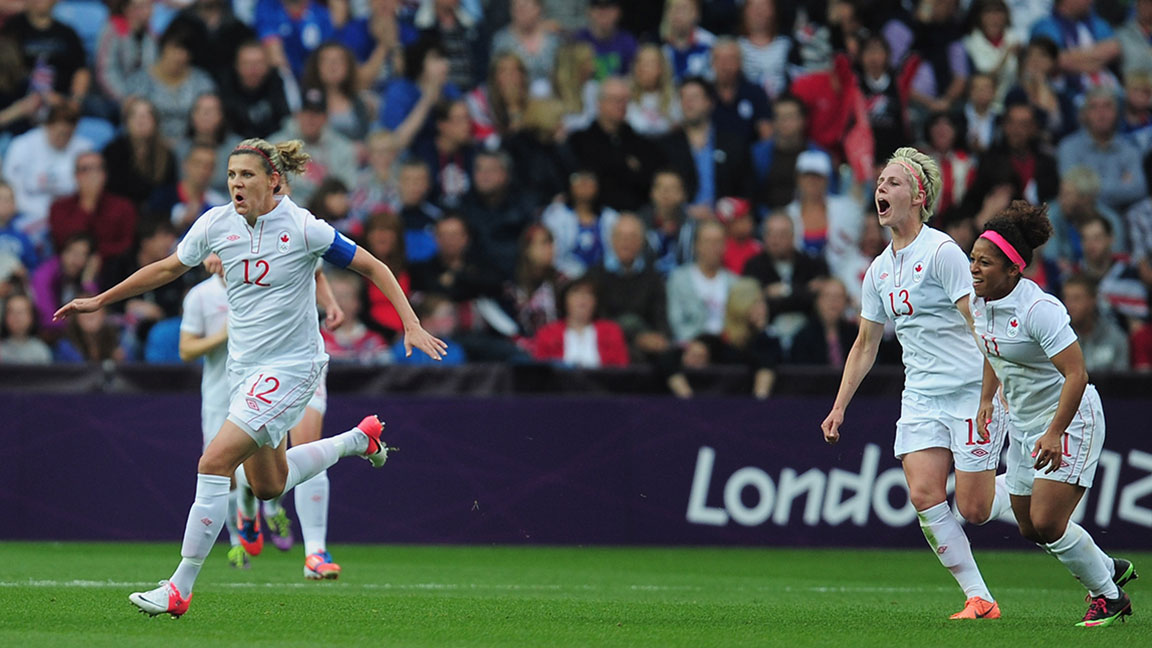
In the Quarterfinals, Jonelle Filigno scored first against Great Britain in the 12th minute, then Christine Sinclair scored on a free kick from outside the 18-yard box. It was the 140th goal of her international “A” career, although just the second she had ever scored direct from a free kick (see Germany 2011 for Sinclair’s other magical free kick, incidentally also Canada’s only goal at the FIFA World Cup in 2011).
With the Quarterfinals win over Great Britain, this marked the first time that Canada were in a global Semifinals since the 2003 FIFA World Cup in the United States (Canada finished fourth that year). At full time in Coventry, Canada already knew who they were facing next and where they were going to be playing in the London 2012 Olympic Semifinals: it was a two-hour bus ride up north to face their age-old rivals the Americans at Manchester’s historic Old Trafford.
What happened three days later, plus another three days after that, was truly crazy and forever unforgettable.
Sinclair scored once, she scored twice, she scored three times against the Americans. In a flash, there was an entire nation back home watching her every move in amazement. There was her little dribble around Kelley O’Hara for the opener, a jumping header to the near post past Hope Solo, and her stealthy escape from Megan Buehler on a corner kick so that she could hit her second jumping header to the top left corner past the diving defender Amy LePeilbet.
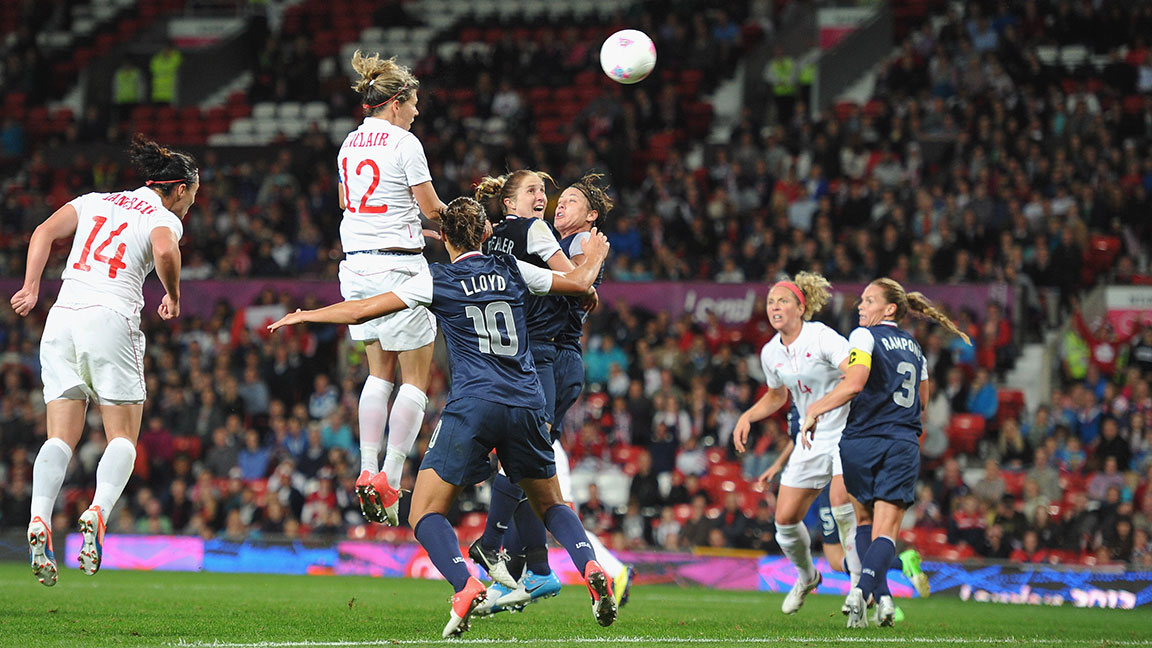
“Christine Sinclair is the best player in the world,” said teammate Diana Matheson. “It is just a pleasure to play with her and her performance in the Olympic Games was above and beyond even what she does every day. She galvanized the country.”
We were all Christine Sinclair that day, our arms stretched gliding like an eagle on the first goal, a kiss to the fans and a rodeo-like rope celebration on the second, and those steely eyes on the third, both arms pumping “let’s go” to her teammates as we took an unbelievable 3-2 lead against the Americans in the Olympic Semifinals.
“My entire career has been about inspiring the next generation,” reflected Christine Sinclair years later. “I think with (London 2012) that was our rallying cry. I am now teammates with players that tell me they remember watching those Olympic Games and that’s when they decided they wanted to play for Canada.”
We all remember those Olympic Games, even if we’ll forget the next 15 minutes plus extra time as Canada were relegated to the Bronze Medal Match, but we all stood behind her and her teammates. Three days later, an entire nation stood as an impenetrable wall as France failed time and time again to beat us for an Olympic Medal.
“They’ve come to see the flag rise,” said Herdman. “That’s the job. They came here for that and the job is not finished.”
We only needed one goal and we got it on the Matheson winner in the last minute, but it was Sinclair again on the attack that created the momentum that Canada needed when it mattered most. She won a free kick in the 90th minute and within two minutes we were up 1-0. Another 10 seconds after that, we were Olympic Bronze Medal winners.
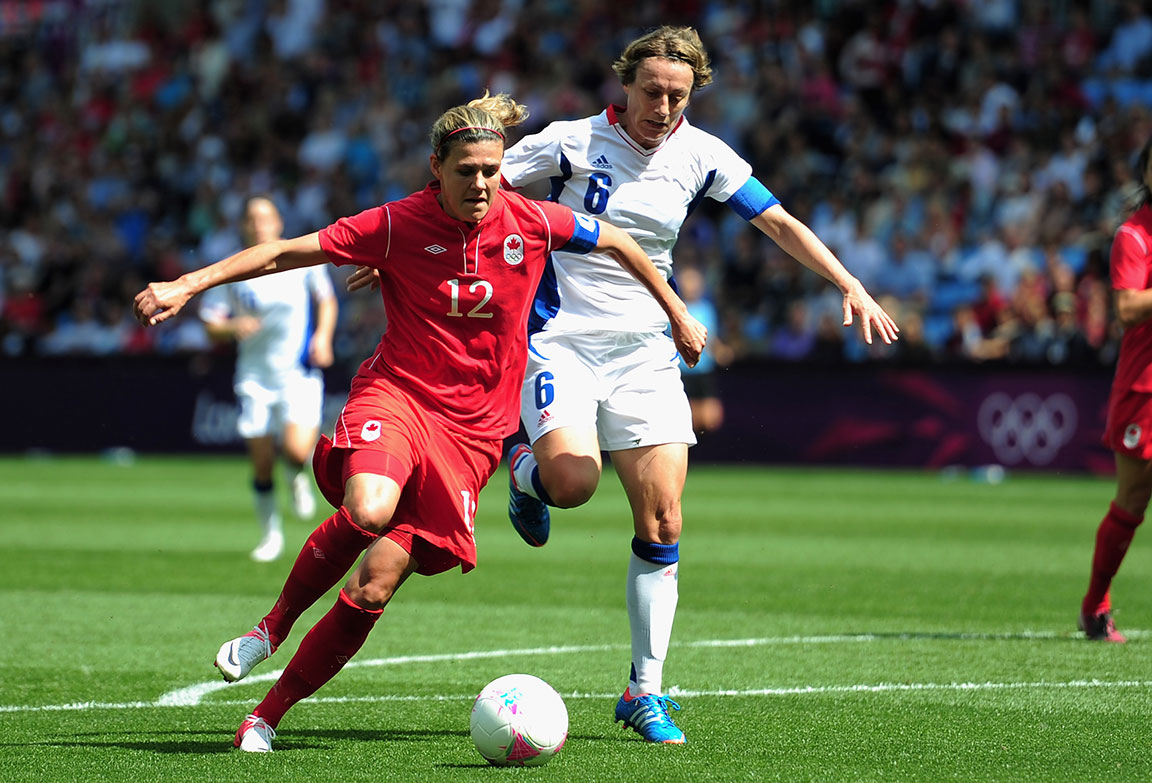
“We’re just exhausted and we just battled and battled and got a few lucky breaks and we got one chance in the end and we made it count,” said Sinclair. “We just won an Olympic Medal and nothing else matters right now.”
Crazy, but true.
Canada have never looked back as a football nation. They were even better in 2016 when they won their second Olympic Bronze Medal, the first time in more than 100 years that a Canadian team won back-to-back Medals at the Summer Olympic Games. Then in 2021, they won it all after they beat the Americans in the Olympic Semifinals and captured the Olympic Gold Medal in a shootout against Sweden in the Final.
Champions at last.
“Now it’s only going to be bigger,” said Sinclair in 2021. “That next generation of young kids that watched Canada win Gold in Tokyo will be on the National Team and hopefully it will bring more and more opportunities for the young kids.”
As Sinclair takes her last international bow in 2023, it’s hard not to reflect on the past 11 years since that first Olympic Bronze Medal, let alone the last 24 years since Sinclair first featured in a Canada lineup. It feels like she’s always been there, especially when it matters most.
Through it all, she’s been the beating heart of a nation, the superhero in a red Canada cape, that guiding light to her teammates, and an inspiration to the next generation of Olympic champions.
